RED DEER – Milk may be the perfect food, but governments have soured it with less than perfect policies, says an American dairy analyst.
“Dairy policy is the single most complicated policy that we have for a commodity in the U.S.,” said Scott Brown of the University of Missouri at the recent western Canadian dairy seminar held here.
The United States government has attempted to streamline its dairy program for 15 years, he said, yet successive farm bills have failed. Some bills attempted to eliminate support plans, but 11th hour extensions have ensured that producers continue to receive substantial help.
Read Also

Manitoba extends Crown land rent freeze
Manitoba government links the continued rental rate freeze on grazing and forage leases to economic and environmental challenges facing the industry
Scott suspects current supports could last until 2001 because U.S. dairy prices have plunged and it is an election year.
“We’ll probably see a move for more direct assistance.”
Direct support to dairy producers has totaled $450 million (U.S.) in the last two years.
Reform to regional dairy pools has drawn mixed reaction because of price differences.
All milk used in a region is pooled and producers are paid a blended price for milk and cheese.
A debate erupts when some regions use greater amounts of fluid milk compared to processing milk, which means they are paid more for fluid milk than areas that use less.
Further debate arose with the formation of the Northeast Dairy Compact approved in the 1996 farm bill.
If class one table milk falls below $16. 94 per hundredweight, the compact commission triggers a differential to prevent prices from falling lower. As well, the compact agreement does not allow milk to flow in from other areas.
“There are a lot of folks in the upper Midwest that would love to ship milk into the northeast area,” said Scott. “It’s interesting in the United States that we continue to talk about free trade, yet we have our own regional set of states that basically won’t allow trade from other states.”
A month ago, a group of states including Texas and Georgia asked to form a southern compact.
“It is unclear whether compacts will continue to grow or not.”
Considerable expansion is also taking place on American dairies.
Prices are low, yet large dairy farms are developing at a time when the smaller ones are not leaving fast enough, which could cause a price crash.















